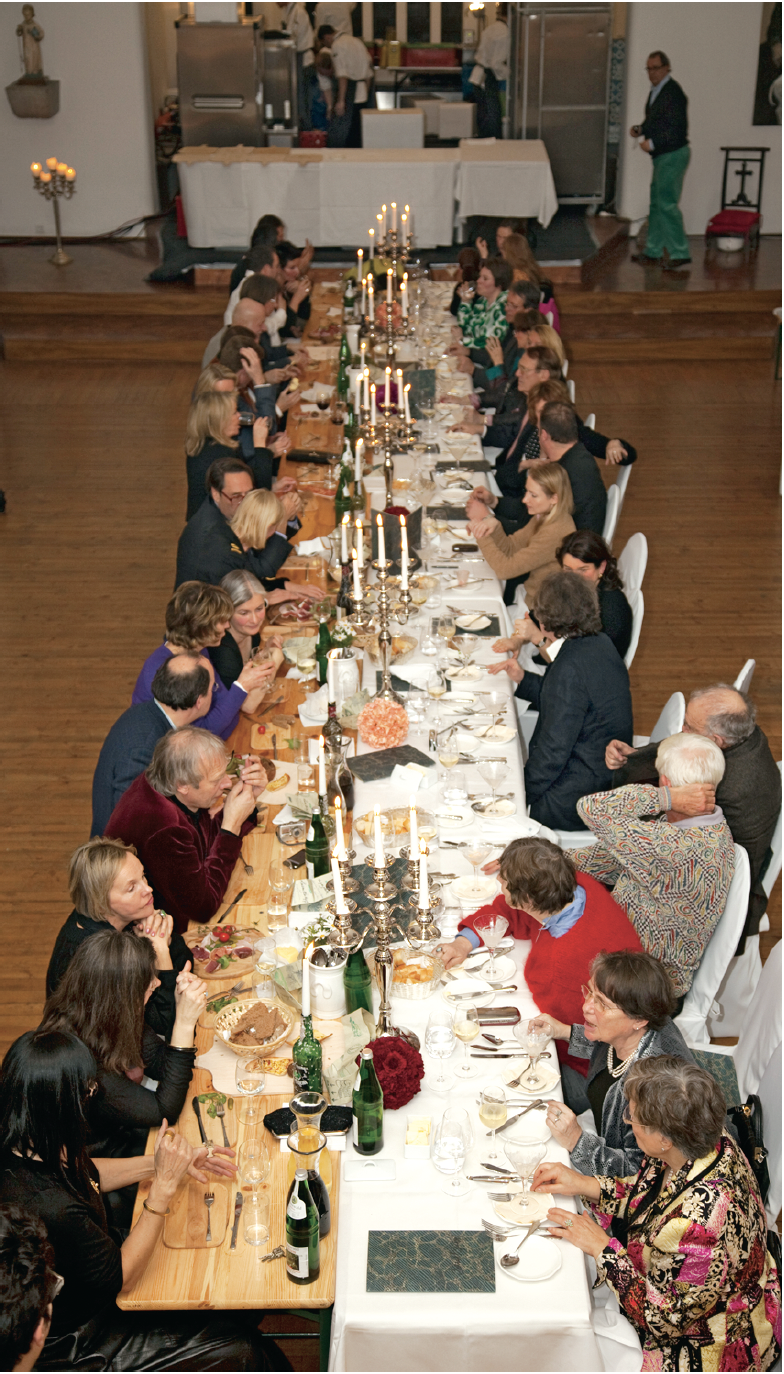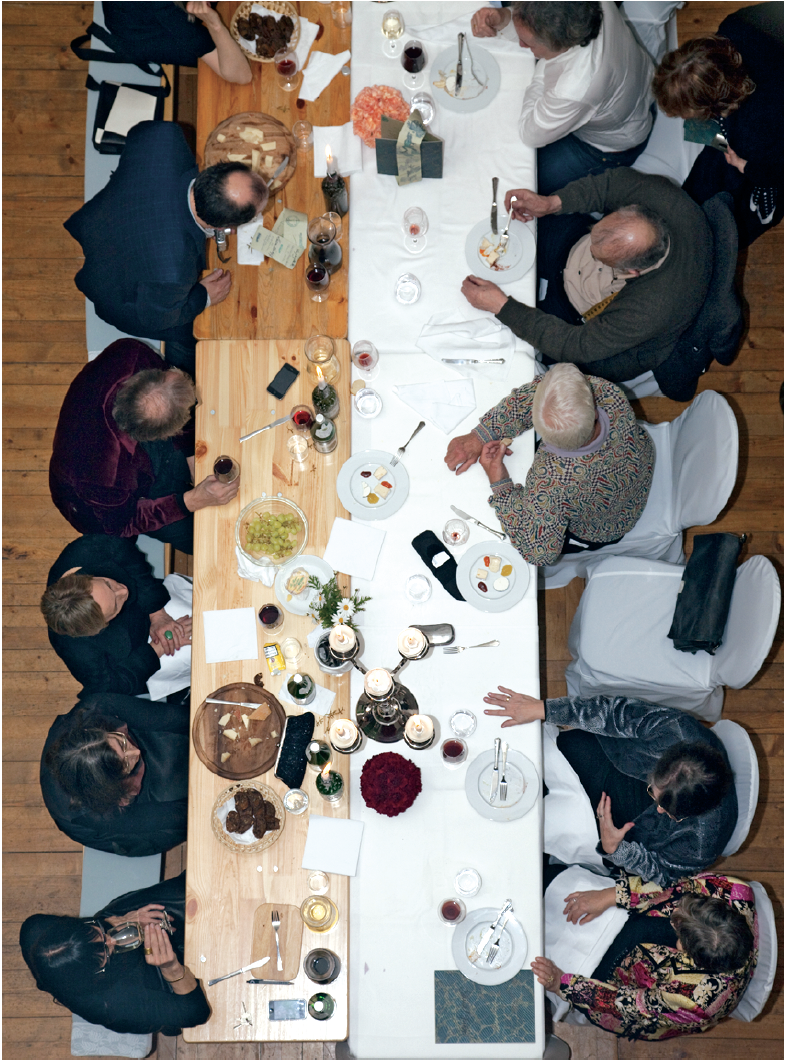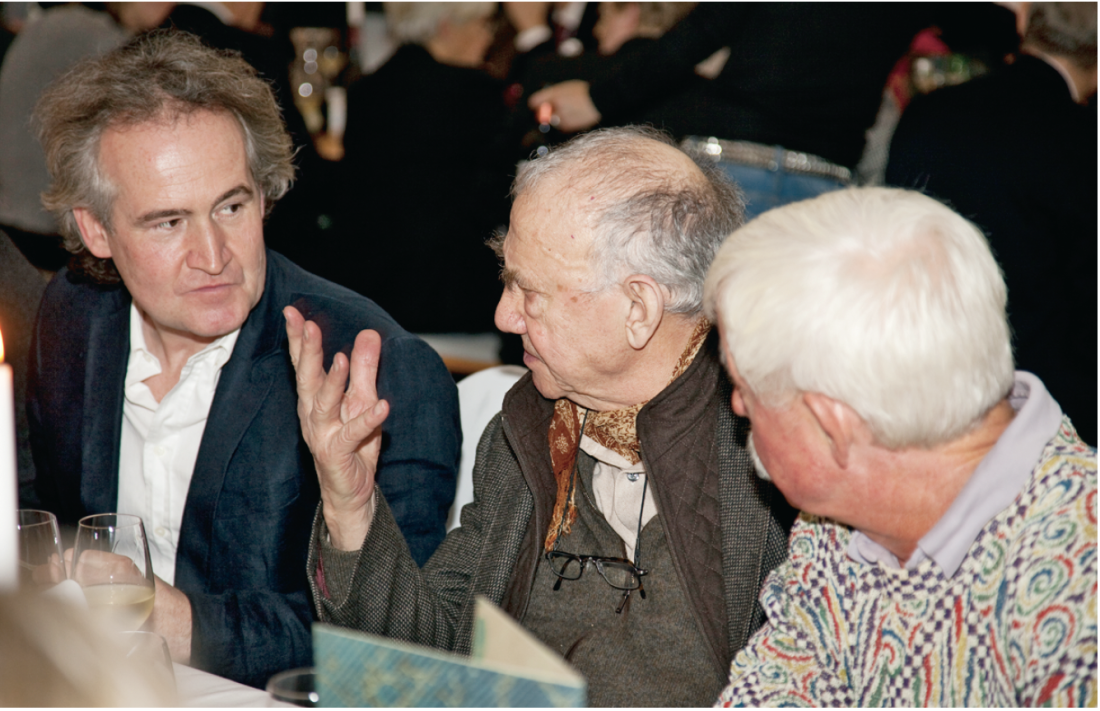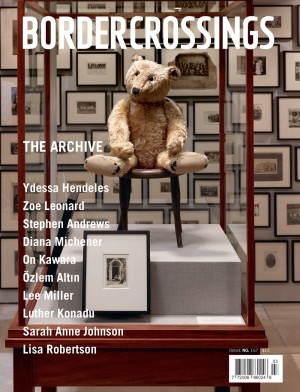Daniel Spoerri

Installation views of Daniel Spoerri’s “Un coup de dés” at Haus Maria Theresia in Dusseldorf, Germany, on February 5, 2010. Photographs: Christian Kampschroer. All photographs courtesy of Kunsthalle Dusseldorf.
After being pelted by rain, I found the cloistered foyer of Haus Maria Theresia a true sanctuary: it is an art-deco-inspired church, and the hosting venue for Daniel Spoerri’s reperformance of his 1980 “Un coup de dés” dinner-cum-artwork, titled after an 1897 Stéphane Mallarmé quote. The event was limited to 100 guests, and was positioned as something of an elite program in celebration of the Kunsthalle Dusseldorf’s survey of food-based artworks, “Eating the Universe: Food in Art.” While many excellent works were included in this exhibition, the links between them were tenuous at best: food was at play in them somewhere, simply. Jana Sterbak, Carsten Höller, Spoerri, the unavoidable Rirkrit Tiravanija and nearly three-dozen others all found their way into this show. It was a rare treat before the Spoerri event, however, to watch all of Paul McCarthy’s Sailor’s Meat Sailor’s Delight, an early video work that includes footage of a negligee-clad McCarthy smashing bottles of ketchup and mayonnaise on the floor, which he then kneads with his bare feet. While crushing shards of glass under his heels, he moans with a vertigo-inducing mixture of pleasure and agony. The low-fi quality of the video makes it impossible to discern ketchup from blood, both of which are amply present. Rarely have I felt so deeply repulsed. This video was the ideal prelude to Spoerri’s meaty evening meal, which tested my mettle as a recovering vegetarian.
After steeling my digestive system with a thin base coat of foie gras before the event—why not start with the best and most ethically riddled?—I was certain that my critical faculties would be matched by my gustatory facility. Upon entry to “Un coup de dés,” each guest was assigned a random number, having been first greeted by the gracious staff of the Kunsthalle. Next, a glass of Gosset champagne and a circulating tray of two varieties of amuse-gueule (the first seemed to be pistachio, smoked salmon and crème fraiche, the second a heady combination difficult to identify, perhaps containing aspic) delivered by well-heeled wait staff.
The game commenced when Spoerri, in booming baritone, announced we would be split into two groups according to the roll of the dice, one team being designated rich and the other poor. Most were good humoured about this proposal, but a few recoiled at being relegated to the side of poverty. “Tickets were €100 after all,” they might have thought to themselves. Fortune dictated that I be appointed poor for the evening. Spoerri later remarked to me that being rich isn’t very chic these days anyway.

Installation views of Daniel Spoerri’s “Un coup de dés” at Haus Maria Theresia in Dusseldorf, Germany, on February 5, 2010. Photographs: Christian Kampschroer. All photographs courtesy of Kunsthalle Dusseldorf.
The church was furnished with three long banquet tables, each of these being split down the middle by decorations deemed appropriate for each class. On the poor side: bare wood trays, candles in wine bottles, paper napkins and table wine by the carafe. For the rich: fine china, ridiculously opulent candelabras, cloth napkins and fine vintages of wine.
I found myself emotionally involved in this drama before the first of the seven courses was served. Not only did the printed menu include my worst food phobias, promising a parade of pork, but while we dined, a Jean-Seberg-mopped aristocrat opposite me, with the largest diamond earrings I have ever seen, grinned with what I’m sure was righteous contempt. With regal bearing, she unflinchingly maintained self-possessed eye contact with me while a waiter poured her a healthy glass of red wine. I was left to serve myself from a modest carafe. This competition continued for the first half of the evening—with rich and poor locked in a strange and wicked refusal to speak much to one another, peppered with sudden outbursts: “Do not take our wine!” one poor woman exclaimed. After several glasses of the stuff, the social temperature of the room became moderate, and by desserts (there were three) the two sides came to a frolicking and collegial understanding, with some riches and pauvres exchanging sides, sharing forkfuls of meals. I coerced one ebullient aristocrat to share her mysteriously named Médaillon de Lotte de l’Antlantique avec des artichauts et Dialogue de poivrons et paprikas et Pommes rissolees.
I was completely satisfied, and even exhilarated, by the deep, wine-soaked lentil soup the colour of India ink served with potato skins deep fried in what I can only guess was duck fat and truffle oil. (Simultaneously, the rich ate the poached and rather sad looking potatoes liberated from said skins.) This possible flavour of truffle was the first hint that something much more complex was at work in Spoerri’s event. Was it possible the poor were actually eating a meal made with finer ingredients than the rich? Many of my poor collaborators and I shared knowing looks and even some whispered intuitions that the rich had been duped. While it was not revealed at any point in the evening, our suspicions were confirmed the next morning. Spoerri instructed the chef to use foodstuffs of the highest calibre for the poor menu, but to craft each dish after the fashion of simple peasant fare. As the evening progressed, the rich must have sensed that such was the case, for some became increasingly petulant, incorrigible and brash: a few managed to smuggle our toothsome rye bread and country-churned butter across the borderline.

Daniel Spoerri (centre) at his performance of “Un coup de dés” at Haus Maria Theresia in Dusseldorf, Germany, on February 5, 2010. Photograph: Christian Kampschroer. Courtesy of Kunsthalle Dusseldorf.
To my surprise, Spoerri had had little involvement in determining the precise details of the menu, which was left primarily in the hands of the extremely capable and imaginative chef Volker Drkosch of the Dusseldorf caterer Victorian Restaurant. The next day over breakfast, the artist told me that while the meal was delicious it struck slightly the wrong note in his opinion: the distance between rich and poor was not dramatic enough. Likewise with the table service. Spoerri planned the evening to end with the poor side of the table littered with a mass of comestibles, platters, baskets and cutlery. The extremely efficient and friendly wait staff were a bit too eager to clear dishes and tidy for les pauvres. Appropriate to a meal of class difference, the rich had regal and fussy treatment by staff: every plate was swiftly removed (sometimes before the guests had finished) and replaced by another, even more opulent course. This treatment had dramatic effects on the behaviour on each side of the table, at least at the beginning of the meal: les riches were quieter, somewhat more rigid and self-satisfied that they had won the apparent golden fleece of the night. Spoerri’s project was a moralistic piece of theatre that inverted class difference through role play but managed ultimately to reveal that all present at the meal were in a greatly privileged position. Coming from a solidly middle class background, I cannot pretend to have experienced true poverty first hand. Playing at subaltern left me feeling ethically vacant and troubled. It was a humbling endpoint to reach after an evening of bounty and festivity. ❚
“Un coup de dés” was held at Haus Maria Theresia in Dusseldorf, Germany, on Feburary 5, 2010.
Mark Clintberg is an art historian, artist and curator based in Montreal, Quebec.

